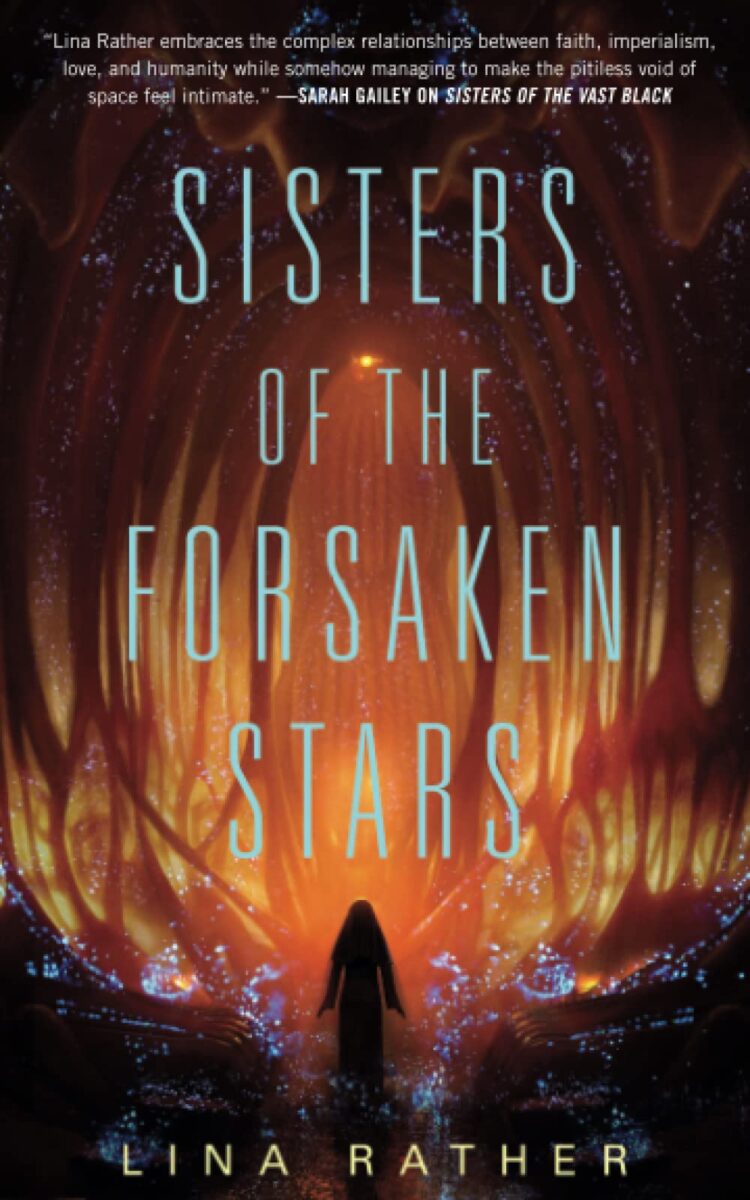I’m not trying to be tautological when I say that history is written by the writers, cute as it may sound. And I’m not talking about historians. I’m not even professional writers, whether of fiction or journalism or what-have-you. I’m talking about writing history as it happens, taking control of a narrative that is still inchoate. When there are too many facts, and those facts are all too terrible, what narrative do you impose on them? What do you show in a better light, and what do you leave in shadow?

This is the dilemma that formerly-Sister, now-Mother Lucia and her miniscule order are faced with in the aftermath of the first book, Sisters of the Vast Black. They have evidence that the Central Governance conspired to unleash a plague on a group of settlers who were not willing to acquiesce to their rule. The Church learned of this, but refused to act. Only the Sisters stopped this act of genocide, but many still died, and the rest had to flee to even further reaches of space to hide.
If you don’t remember all the details of the first book, never fear: this book integrates its reminders beautifully, without infodumping but with reminders of every helpful detail. I always appreciate when authors can do that, since the past few years have decimated my recall ability. We pick up again only a little while later, to find the sisters in a nervous holding pattern. They have avoided attention thus far, but rumors are growing and their coffers are shrinking. They can barely afford their itinerant ministry, especially now that they have broken from the Church, but they can even less afford to be recognized.
An effective paranoia hums through the novella, keeping the tension high and the world vast. It’s impressive to me how much Rather is able to make us feel and understand about the sheer extent of this interstellar empire, stretched far too thin over distances but also condensed too tightly into ships and stations that must ration every crumb of food and light and air. It’s a world perpetually on the brink, separated from the void by fallible human constructions both physical and social.
Rather doesn’t have a lot of faith in organizations, but she does have faith in people. The victories in this book, and the previous (and hopefully in future books??), are all won by one person speaking to another with kindness. They are not—and, it seems, cannot be—won while dealing with institutions. Institutions do not care. Or, at least their caring is self-serving.
But the Sisters are also an institution, albeit a small one. Their traditions may be in flux given their schism, but they still have to examine their own pull toward conservatism, and what that even means. To conserve—is that the same as preserving life and human dignity, or does it only describe jealously guarding what few scraps they have been allowed? Can they accept new postulates, or reasonably offer refuge when they are themselves in terrible danger? Can they claim to be moral actors if they hide the truth, or is hiding the truth the most moral action, given that the facts they know might reasonably start a war?
Mother Lucia bears this burden most of all, since she is explicitly responsible for those under her care. Command is weighty in Sisters of the Forsaken Stars, and irreducibly complex. All the sisters, though, have their turn at shouldering the burden as events quickly move beyond their ability to control. They can only influence, and try to choose the direction of least possible suffering.
A lot of people who have experienced suffering are told to “have faith.” Sister Faustina especially, like most people who hear that inane phrase, asks “how?” and then sets about giving us some possible answers. Not all the nuns aboard the unnamed ship have faith in the traditional sense, that warm feeling of certainty. Faith, like everything, is fragile in a void, and requires constant maintenance. The daily work as well as the acts of extraordinary grace are both on display here, a remarkable achievement for a novella.
It’s also remarkable how well Rather holds the word“faith” in tension with its many valences. Sisters of the Forsaken Stars is not just about religious faith in an omnipotent god. It is about the faith humans have in one another, and the faith that the universe holds marvels worth studying instead of just resources worth exploiting. The struggle between science and faith is a tired debate, and I’m so relieved that Rather isn’t trying to relitigate it. Both are essential to human survival, both and more. Honesty and curiosity, understanding and forgiveness—all the great things that humans are capable of are just—just—enough to squeak past the greed, violence, and indifference that we so excel at.
Sisters of the Forsaken Stars will be released February 15th. Thanks to Tor for sending us a review copy!
